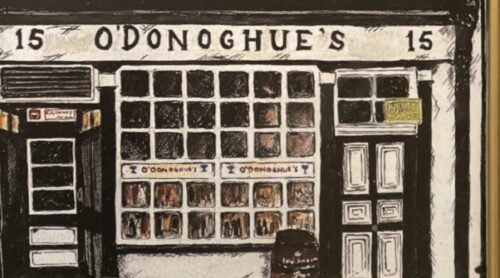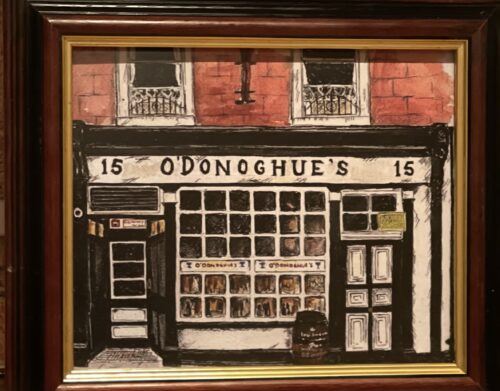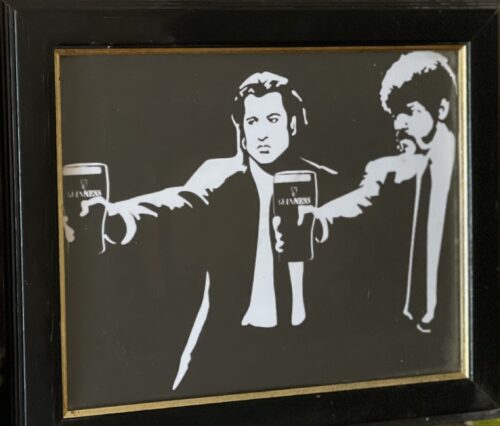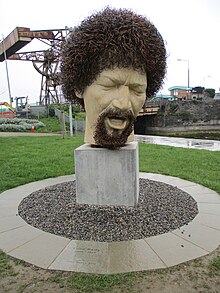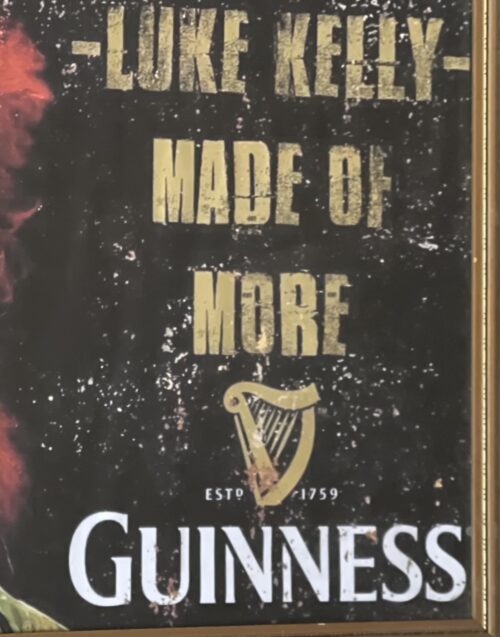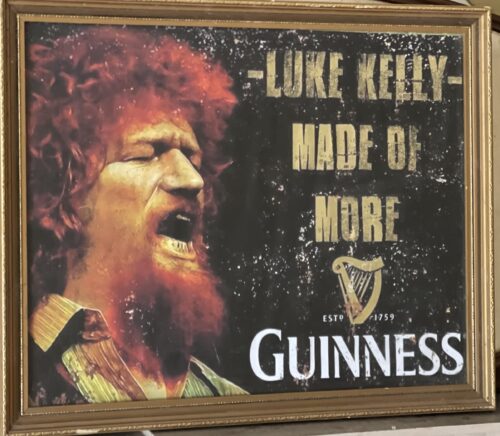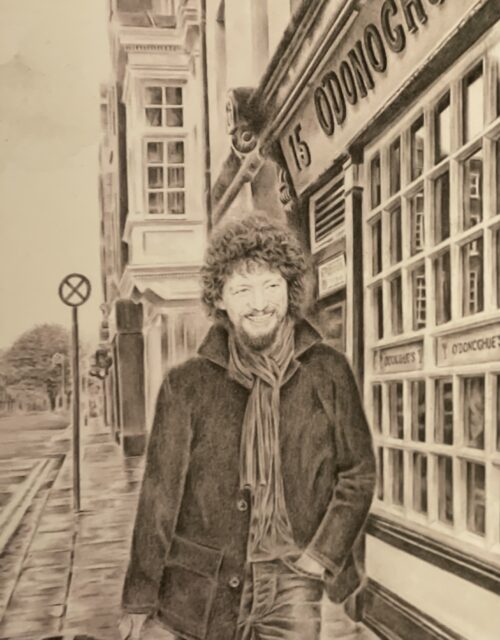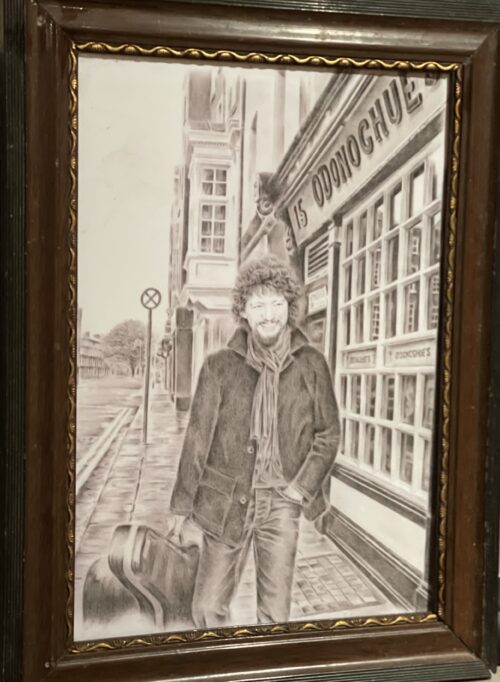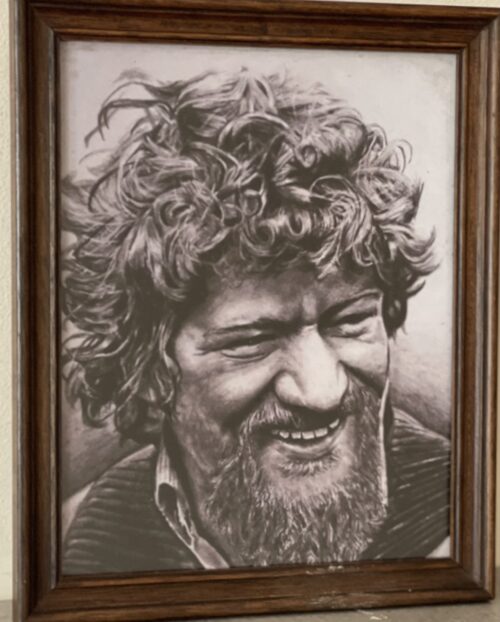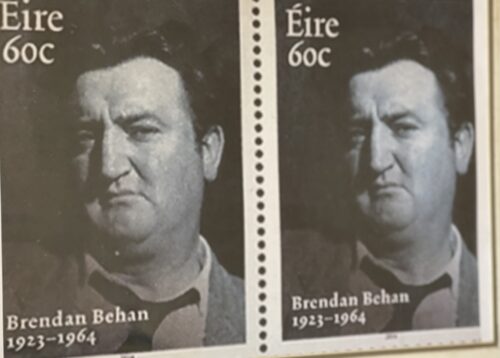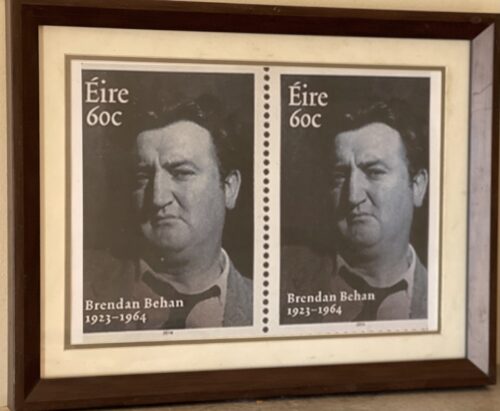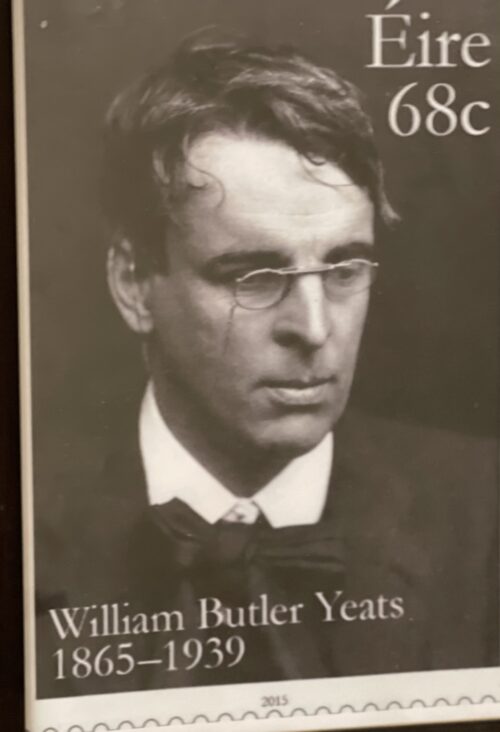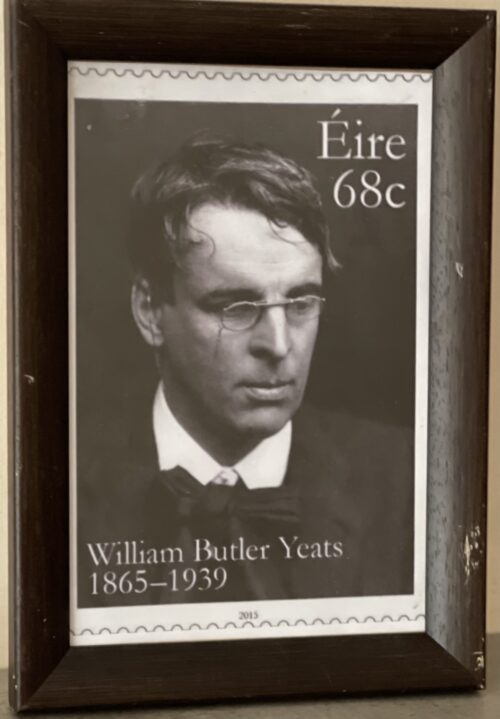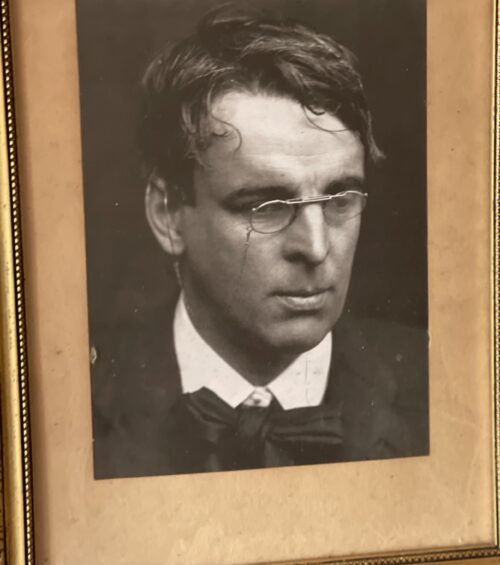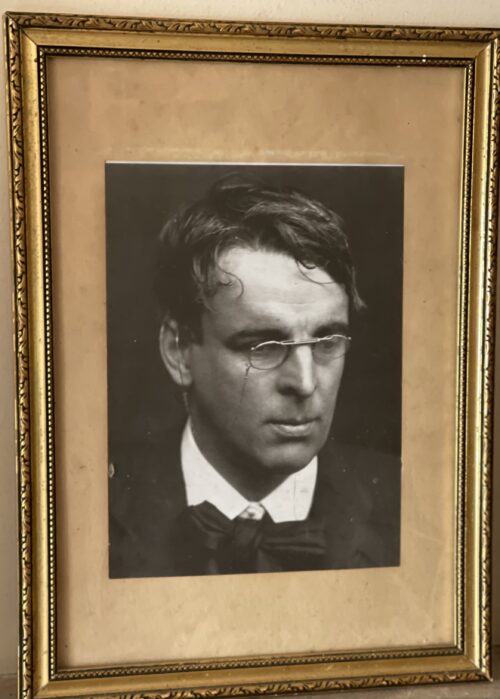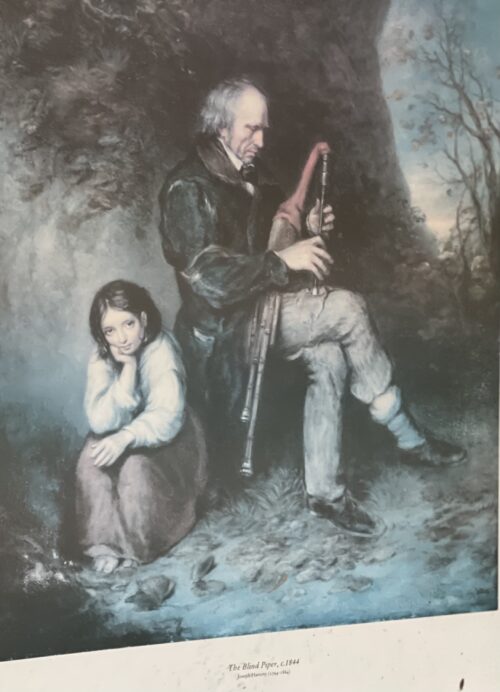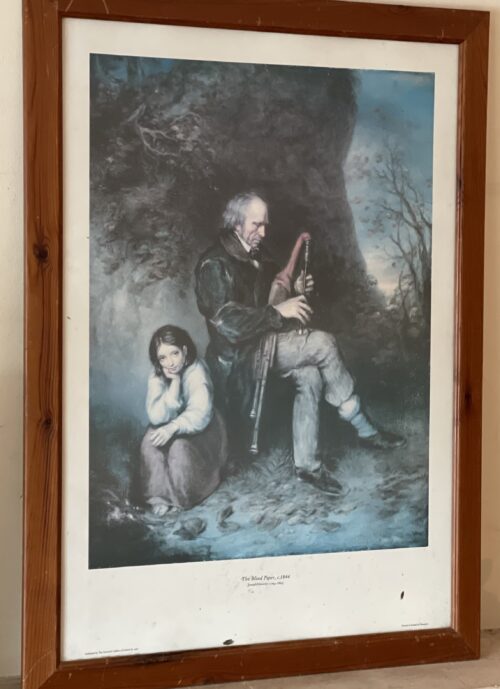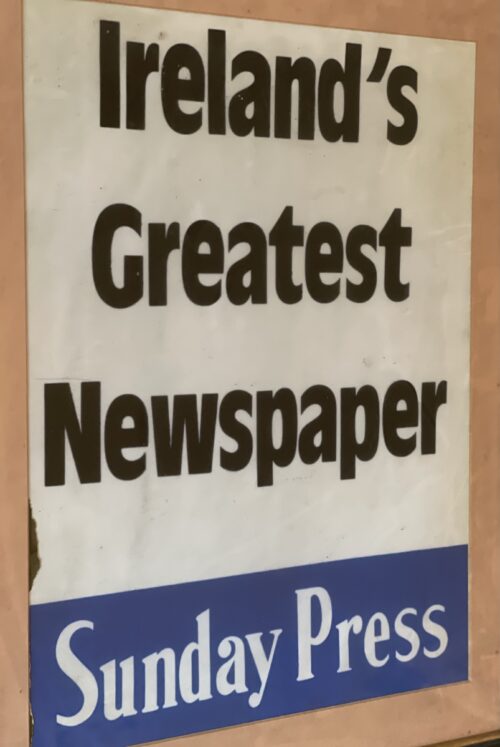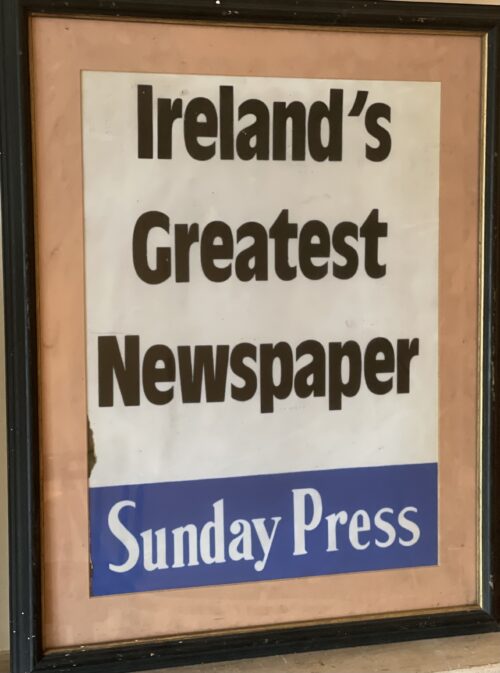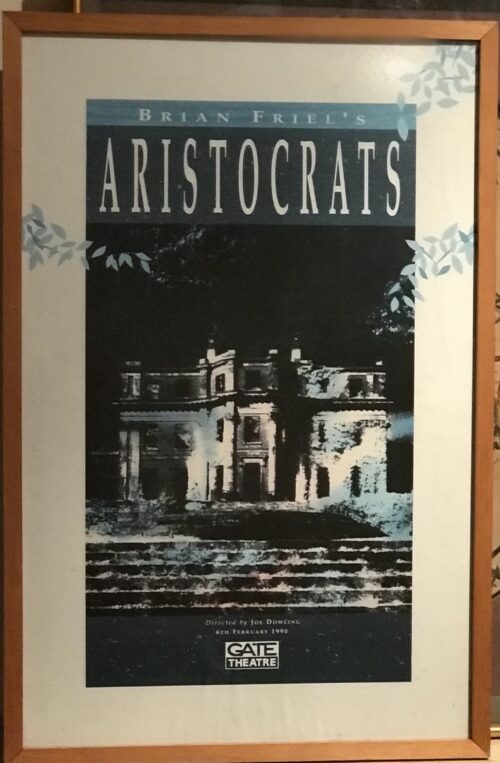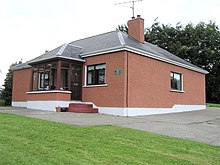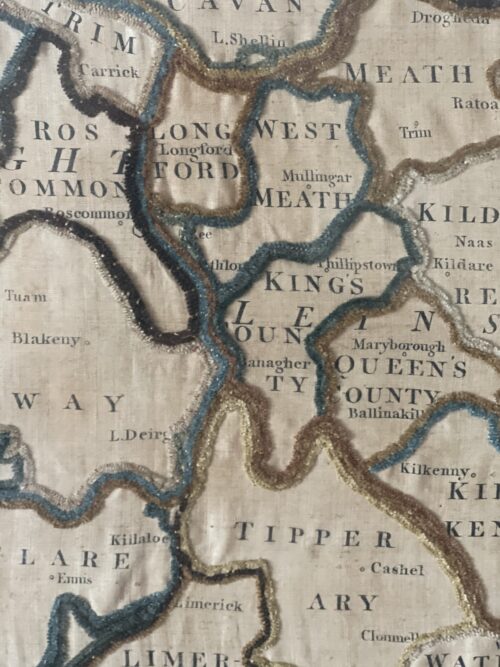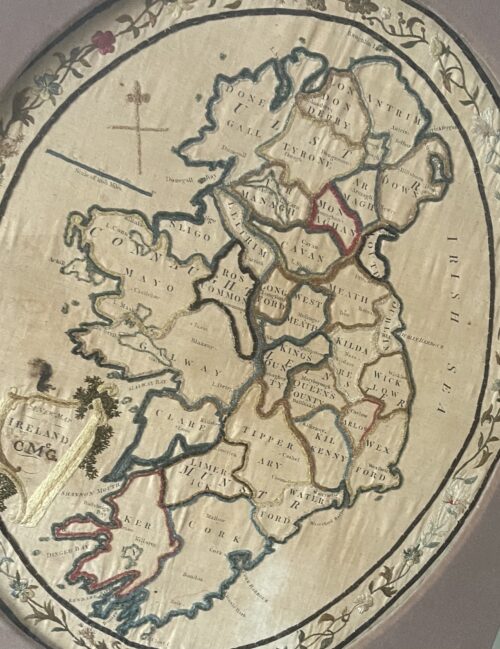64cm x 44cm Dublin
Brian Patrick Friel (9 January 1929
– 2 October 2015) was an Irish
dramatist, short story writer and founder of the
Field Day Theatre Company.
He had been considered one of the greatest living English-language dramatists.
He has been likened to an "Irish
Chekhov"
and described as "the universally accented voice of Ireland".
His plays have been compared favourably to those of contemporaries such as
Samuel Beckett,
Arthur Miller,
Harold Pinter and
Tennessee Williams.
Recognised for early works such as
Philadelphia, Here I Come! and
Faith Healer, Friel had 24 plays published in a career of more than a half-century. He was elected to the honorary position of
Saoi of
Aosdána. His plays were commonly produced on Broadway in New York City throughout this time, as well as in Ireland and the UK.
In 1980 Friel co-founded
Field Day Theatre Company and his play
Translations was the company's first production.
With Field Day, Friel collaborated with
Seamus Heaney, 1995 recipient of the
Nobel Prize in Literature.
Heaney and Friel first became friends after Friel sent the young poet a letter following publication of his book
Death of a Naturalist.
Friel was a member of the
American Academy of Arts and Letters, the British
Royal Society of Literature and the Irish Academy of Letters.
He was appointed to
Seanad Éireann in 1987 and served until 1989. In later years,
Dancing at Lughnasa reinvigorated Friel's oeuvre, bringing him
Tony Awards (including
Best Play), the
Laurence Olivier Award for Best New Play and the
New York Drama Critics Circle Award for Best Play. It was also
adapted into a film, starring
Meryl Streep, directed by
Pat O'Connor, script by
Frank McGuinness.
Personal life
Friel was born in 1929 at
Knockmoyle, before the family moved to Killyclogher close to
Omagh,
County Tyrone. His exact birth date and name are ambiguous. The parish register lists a birth name of
Brian Patrick Ó'Friel and a birth date of 9 January. Elsewhere his birth name is given as
Bernard Patrick Friel (reportedly on the grounds that "Brian" was not recognised by the registrar as an acceptable forename) and his birth date as 10 January. In life he was known simply as
Brian Friel and celebrated his birthday on 9 January. His father was Patrick Friel, a primary school teacher and later a councillor on Londonderry Corporation, the local city council in
Derry. Friel's mother was Mary née McLoone, postmistress of
Glenties,
County Donegal. The family moved to
Derry when Friel was ten years old. There he attended
St Columb's College (the same school attended by
Seamus Heaney,
John Hume,
Seamus Deane,
Phil Coulter,
Eamonn McCann and
Paul Brady).
Friel received his B.A. from
St Patrick's College, Maynooth (1945–48), and qualified as a teacher at
St. Joseph's Training College, Belfast in
Belfast, 1949–50. He married Anne Morrison in 1954, with whom he had four daughters and one son. Between 1950 and 1960, he worked as a Maths teacher in the Derry primary and intermediate school system, taking leave in 1960 to pursue a career as writer, living off his savings. In the late 1960s, the Friels moved from Derry to Muff, County Donegal, before settling outside
Greencastle, County Donegal.
Friel supported
Irish nationalism and was a member of the
Nationalist Party.
After a long illness Friel died on 2 October 2015 in
Greencastle, County Donegal and is buried in the cemetery in
Glenties, Co. Donegal.
He was survived by his wife Anne and children Mary, Judy, Sally and David. Another daughter, Patricia, predeceased him.
Career
A common setting for Friel's plays is in or around the fictional town of "
Ballybeg" (from the
Irish Baile Beag, meaning "Small Town").
There are fourteen such plays:
Philadelphia, Here I Come!,
Crystal and Fox,
The Gentle Island,
Living Quarters,
Faith Healer,
Aristocrats,
Translations,
The Communication Cord,
Dancing at Lughnasa,
Wonderful Tennessee,
Molly Sweeney,
Give Me Your Answer Do! and
The Home Place, while the seminal event of
Faith Healer takes place in the town. These plays present an extended history of this imagined community, with
Translations and
The Home Place set in the nineteenth century, and
Dancing at Lughnasa in the 1930s. With the other plays set in "the present" but written throughout the playwright's career from the early 1960s through the late 1990s, the audience is presented with the evolution of rural Irish society, from the isolated and backward town that Gar flees in the 1964
Philadelphia, Here I Come! to the prosperous and multicultural small city of
Molly Sweeney (1994) and
Give Me Your Answer Do! (1997), where the characters have health clubs, ethnic restaurants, and regular flights to the world's major cities.
1959 – 1975
Friel's first radio plays were produced by
Ronald Mason for the
BBC Northern Ireland Home Service in 1958:
A Sort of Freedom (16 January 1958) and
To This Hard House (24 April 1958).
Friel began writing short stories for
The New Yorker in 1959 and subsequently published two well-received collections:
The Saucer of Larks (1962) and
The Gold in the Sea (1966). These were followed by
A Doubtful Paradise, his first stage play, produced by the Ulster Group Theatre in late August 1960. Friel also wrote 59 articles for
The Irish Press, a Dublin-based party-political newspaper, from April 1962 to August 1963; this series included short stories, political editorials on life in Northern Ireland and Donegal, his travels to Dublin and New York City, and his childhood memories of Derry, Omagh, Belfast, and Donegal.
Early in Friel's career, the Irish journalist Sean Ward even referred to him in an
Irish Press article as one of the Abbey Theatre's "rejects". Friel's play,
The Enemy Within (1962) enjoyed success, despite only being on Abbey stage for 9 performances. Belfast's Lyric Theatre revived it in September 1963 and the BBC Northern Ireland Home Service and Radio Éireann both aired it in 1963. Although Friel later withdrew
The Blind Mice (1963), it was by far his most successful play of his very early period, playing for 6 weeks at Dublin's Eblana Theatre, revived by the Lyric, and broadcast by Radio Éireann and the BBC Home Service almost ten times by 1967. Friel had a short stint as "observer" at Tyrone Guthrie's theater in early-1960s Minneapolis; he remarked on it as "enabling" in that it gave him "courage and daring to attempt things".
Shortly after returning from his time at the Tyrone Guthrie Theatre, Friel wrote
Philadelphia Here I Come! (1964). The play made him instantly famous in Dublin, London, and New York.
The Loves of Cass McGuire (1966), and
Lovers (1967) were both successful in Ireland, with
Lovers also popular in The United States. Despite Friel's successes in playwriting
, Friel in the period saw himself as primarily a short story writer, in a 1965 interview stating, "I don't concentrate on the theatre at all. I live on short stories."
Friel then turned his attention to the politics of the day, releasing
The Mundy Scheme (1969) and
Volunteers (1975), both pointed, the first bitter, satires on Ireland's government. The latter stages an archaeological excavation on the day before the site is turned over to a hotel developer, and uses Dublin's Wood Quay controversy as its contemporary point of reference. In that play, the Volunteers are IRA prisoners who have been indefinitely interned by the Dublin government, and the term
Volunteer is both ironic, in that as prisoners they have no free will, and political, in that the IRA used the term to refer to its members. Using the site as a physical metaphor for the nation's history, the play's action examines how Irish history has been commodified, sanitized, and oversimplified to fit the political needs of society.
In 1968 Friel was living in Derry City, a hotbed of the
Irish Civil Rights Movement, where incidents such as the
Battle of the Bogside inspired Friel's choice to write a new play set in Derry.
The play Friel began drafting in Derry would become,
The Freedom of the City. Friel, defying a British government ban, marched with the
Civil Rights Association against the policy of internment. The protest Friel took part in was the infamous
Bloody Sunday protests of 1972. In a 1983 interview, Friel spoke of how his personal experience of being fired upon by British soldiers during the
Bloody Sunday riot, greatly affected the drafting of
The Freedom of the City as a political play.
Friel in speaking of the incident, recalled, "It was really a shattering experience that the British army, this disciplined instrument, would go in as they did that time and shoot thirteen people...to have to throw yourself on the ground because people are firing at you is really a terrifying experience."
1976 – 1989
By the mid 1970s, Friel had moved away from overtly political plays to examine family dynamics in a manner that has attracted many comparisons to the work of Chekhov.
Living Quarters(1977), a play that examines the suicide of a domineering father, is a retelling of the Theseus/Hippolytus myth in a contemporary Irish setting. This play, with its focus on several sisters and their ne'er-do-well brother, serves as a type of preparation for Friel's more successful
Aristocrats (1979), a Chekhovian study of a once-influential family's financial collapse and, perhaps, social liberation from the aristocratic myths that have constrained the children.
Aristocrats was the first of three plays premiered over a period of eighteen months which would come to define Friel's career as a dramatist, the others being
Faith Healer (1979) and
Translations (1980).
Faith Healer is a series of four conflicting monologues delivered by dead and living characters who struggle to understand the life and death of Frank Hardy, the play's itinerant healer who can neither understand nor command his unreliable powers, and the lives sacrificed to his destructive charismatic life.
Many of Friel's earlier plays had incorporated assertively avant garde techniques: splitting the main character Gar into two actors in
Philadelphia, Here I Come!, portraying dead characters in "Winners" of
Lovers, Freedom, and
Living Quarters, a Brechtian structural alienation and choric figures in
Freedom of the City, metacharacters existing in a collective unconscious Limbo in
Living Quarters. These experiments came to fruition in
Faith Healer. Later in Friel's career, such experimental aspects became buried beneath the surface of more seemingly realist plays like
Translations (1980) and
Dancing at Lughnasa (1990); however, avant-garde techniques remain a fundamental aspect of Friel's work into his late career.
Translations was premiered in 1980 at
Guildhall, Derry by the Field Day Theatre Company,
with Stephen Rea, Liam Neeson, and Ray MacAnally. Set in 1833, it is a play about language, the meeting of English and Irish cultures, the looming
Great Famine, the coming of a free national school system that will eliminate the traditional hedge schools, the English expedition to convert all Irish place names into English, and the crossed love between an Irish woman who speaks no English and an English soldier who speaks no Irish. It was an instant success. The innovative conceit of the play is to stage two language communities (the Gaelic and the English), which have few and very limited ways to speak to each other, for the English know no Irish, while only a few of the Irish know English.
Translations went on to be one of the most translated and staged of all plays in the latter 20th century, performed in Estonia, Iceland, France, Spain, Germany, Belgium, Norway, Ukraine, the Czech Republic, Hungary, and Poland, along with most of the world's English-speaking countries (including South Africa, Canada, the U.S. and Australia). It won the
Christopher Ewart-Biggs Memorial Prize for 1985.
Neil Jordan completed a screenplay for a film version of
Translations that was never produced. Friel commented on
Translations: "The play has to do with language and only language. And if it becomes overwhelmed by that political element, it is lost."
Despite growing fame and success, the 1980s is considered Friel's artistic "Gap" as he published so few original works for the stage:
Translations in 1980,
The Communication Cord in 1982, and
Making History in 1988. Privately, Friel complained both of the work required managing Field Day (granting written and live interviews, casting, arranging tours, etc.) and of his fear that he was "trying to impose a 'Field Day' political atmosphere" on his work. However, this is also a period during which he worked on several minor projects that fill out the decade: a translation of Chekhov's
Three Sisters (1981),
an adaptation of Turgenev's novel
Fathers and Sons (1987), an edition of Charles McGlinchey's memoirs entitled
The Last of the Name for Blackstaff Press (1986), and Charles Macklin's play
The London Vertigo in 1990. Friel's decision to premiere
Dancing at Lughnasa at the Abbey Theatre rather than as a Field Day production initiated his evolution away from involvement with Field Day, and he formally resigned as a director in 1994.
1990 – 2005
Friel returned to a position of Irish theatrical dominance during the 1990s, particularly with the release of
Dancing at Lughnasa at the turn of the decade. Partly modelled on
The Glass Menagerie by
Tennessee Williams, it is set in the late summer of 1936 and loosely based on the lives of Friel's mother and aunts who lived in Glenties, on the west coast of Donegal.
Probably Friel's most successful play, it premiered at the
Abbey Theatre, transferred to
London's West End, and went on to Broadway. On Broadway it won three
Tony Awards in 1992, including Best Play. A film version, starring
Meryl Streep, soon followed.
Friel had been thinking about writing a "
Lough Derg" play for several years, and his
Wonderful Tennessee (less of a critical success after its premiere in 1993 when compared to other plays from this time) portrays three couples in their failed attempt to return to a pilgrimage sit to a small island off the Ballybeg coast, though they intend to return not to revive the religious rite but to celebrate the birthday of one of their members with alcohol and culinary delicacies.
Give Me Your Answer Do! premiered in 1997 and recounts the lives and careers of two novelists and friends who pursued different paths; one writing shallow, popular works, the other writing works that refuse to conform to popular tastes. After an American university pays a small fortune for the popular writer's papers, the same collector arrives to review the manuscripts of his friend. The collector prepares to announce his findings at a dinner party when the existence of two "hard-core" pornographic novels based upon the writer's daughter forces all present to reassess.
Entering his eighth decade, Friel found it difficult to maintain the writing pace that he returned to in the 1990s; indeed, between 1997 and 2003 he produced only the very short one-act plays "The Bear" (2002), "The Yalta Game" (2001), and "Afterplay" (2002), all published under the title
Three Plays After (2002). The latter two plays stage Friel's continued fascination with Chekhov's work. "The Yalta Game" is concerned with Chekhov's story "The Lady with the Lapdog," "Afterplay" is an imagining of a near-romantic meeting between Andrey Prozorov of Chekhov's
Three Sisters and Sonya Serebriakova of his
Uncle Vanya. It has been revived several times (including being part of the Friel/Gate Festival in September 2009) and had its world premiere at the Gate Theatre in Dublin.
The most innovative work of Friel's late period is
Performances (2003). A graduate researching the impact of
Leoš Janáček's platonic love for Kamila Stosslova on his work playfully and passionately argues with the composer, who appears to host her at his artistic retreat more than 70 years after his death; all the while, the
Alba String Quartet's players intrude on the dialogue, warm up, then perform the first two movements of
Janáček's Second String Quartet in a tableau that ends the play.
The Home Place (2005), focusing on the aging Christopher Gore and the last of Friel's plays set in Ballybeg, was also his final full-scale work. Although Friel had written plays about the Catholic gentry, this is his first play directly considering the Protestant experience. In this work, he considers the first hints of the waning of Ascendancy authority during the summer of 1878, the year before Charles Stuart Parnell became president of the Land League and initiated the Land Wars.
After a sold-out season at the
Gate Theatre in Dublin, it transferred to London's West End on 25 May 2005, making its American premiere at the
Guthrie Theater in September 2007.

